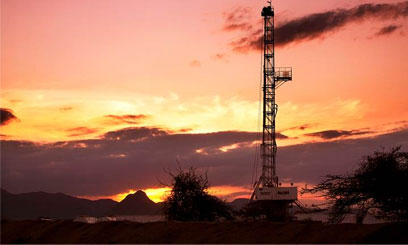NAIROBI, Kenya, Mar 26 – After years of prospecting, Kenya has finally made a breakthrough by striking oil in Turkana County in the north, with focus now shifting to exploring its commercial viability.
The discovery of the light, waxy oil was made in a half-way drilled Ngamia-1 exploration well, raising expectations that there could be huge reserves once the total depth of 2,700 metres is reached.
“The well has been drilled to an initial depth of 1,041 metres and it will continue to a total depth of about 2,700 metres to explore for deeper potential in this prospect,” Energy Minister Kiraitu Murungi said at a press briefing.
President Mwai Kibaki was the first to break the news earlier in the day.
“I have been informed by the Minister for Energy that our country has made a major breakthrough in our oil exploration. This is the first time that Kenya has made such a discovery and it is good news for our country,” the president said.
Coming just two months after the drilling started and being the first well that contractor Tullow Oil Plc had sunk, was an exceptional occurrence.
This is particularly because firms that have been prospecting for oil in the past such as China National Offshore Oil Corporation (CNOOC) and Woodside Energy have not faired very well.
For instance, CNOOC drilled a 5,085 metres deep well in 2010 but did not find any oil forcing them to pull out.
The Turkana find was however beyond expectations even for the company and marks the start of a ‘multi-well exploratory drilling campaign’ which is set to be undertaken over the next three years.
“The well encountered in excess of 20 metres of net oil. Movable oil with an API greater than 30 degrees has been recovered to the surface,” the minister added.
The American Petroleum Institute (API) gravity, is a measure of how heavy or light a petroleum liquid is compared to water.
Although terming the find as ‘good news for Kenya’, Murungi moved to manage expectations saying further tests need to be carried out to determine whether the ‘black gold’ is available in commercial quantities.
If the commercial viability is determined, then it would take up to seven years before commercial production can commence.
In addition, the government now plans to intensify the exploration by giving out more blocs to interested firms.
Further, Murungi said the government would review the Petroleum Exploration and Production Act in order to promote and accelerate the exploration and development of the potential petroleum resources.
While reinforcing that this was only the first step, Tullow Vice President for Africa Tim O’Hanlon was hopeful that if the prospects are good, they would replicate the success in Uganda where potential is believed to be about one to two billion barrels of oil.
“We have our dreams and we have our wishes but we will take it step by step. In Uganda, we started with very modest steps and we have confirmed one to two billion barrels of oil. Here (Kenya), we are hopeful that of the same time of results but Mother Nature is in charge here so we are only following events,” O’Hanlon said adding that the experience gained from Uganda would come in handy.
The company has seven licensed blocks in Northern and Western Kenya which it operates together with Africa Oil.
This will be welcome news to the local community in Turkana which is a poor area and one that has been marginalised for decades.
To ensure that Kenya escapes the ‘oil curse’ and that the local community benefits however, the government will have to ensure transparency in how the extraction will be done and how the revenues will be utilised.
Industry player Patrick Obath said time was ripe to implement the Extractive Industries Transparency Initiative (EITI) which would clearly outline how monies from these activities would be used and help country avert the ‘curse’.
“I would highly recommend that the country adopts an EITI. It’s a very transparent way of accounting for the revenues that come out of extractions for not just oil but gold, diamond activity and even Tiomin,” Obath said.
“There’s got to be a way that you can trace the income streams and be able to work out how those revenues will be shared out between the communities within the county, the national government and the rest of the country,” he added.










































